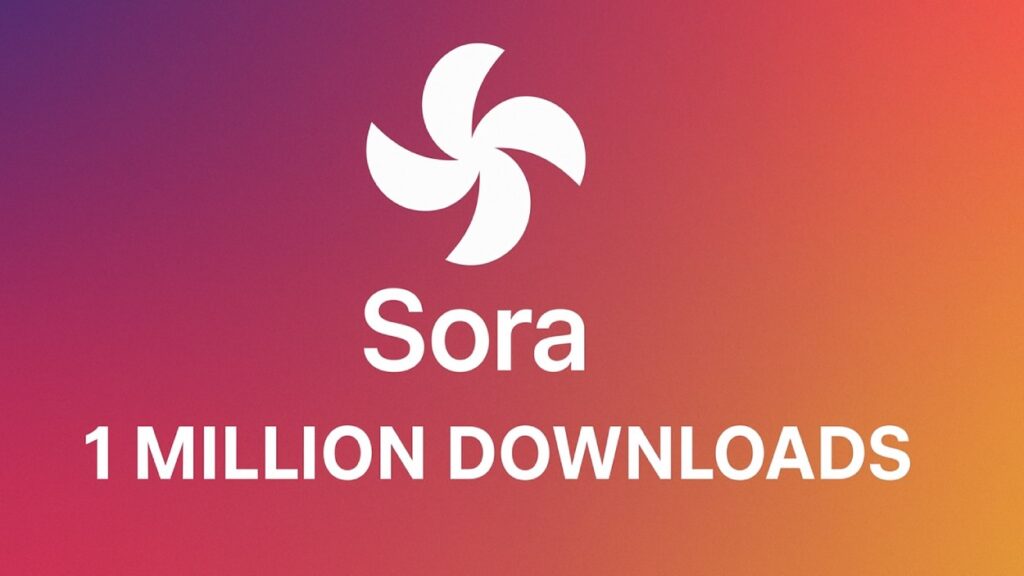OpenAI’s new AI video app Sora has become a viral sensation, racking up over a million downloads in less than a week and outpacing ChatGPT’s iOS launch.
TLDR:
- OpenAI’s Sora app hit 1 million downloads within five days of launch, faster than ChatGPT
- The app is invite-only and limited to the US and Canada but still reached No. 1 on the App Store
- Users can create AI-generated videos and even insert themselves or celebrities using “cameos”
- Concerns over deepfakes and copyrighted content are prompting OpenAI to revise content policies
What Happened?
OpenAI’s latest product, the Sora app, launched on September 30 and hit a staggering 1 million downloads in just five days, even though it is currently invite-only and available only on iOS in the US and Canada. According to Bill Peebles, head of Sora at OpenAI, the app achieved this milestone faster than ChatGPT did at launch.
Backed by the powerful Sora 2 video generation model, the app allows users to generate short AI-powered videos from text prompts and insert real people’s likenesses using a feature called cameos.
sora hit 1M app downloads in <5 days, even faster than chatgpt did (despite the invite flow and only targeting north america!)!
— Bill Peebles (@billpeeb) October 9, 2025
team working hard to keep up with surging growth. more features and fixes to overmoderation on the way!
The App That Blew Past ChatGPT
Despite its limited availability, Sora’s early traction has been explosive. Appfigures reported that Sora hit 627,000 iOS downloads in its first week, surpassing ChatGPT’s 606,000 during the same period last year. With nearly 107,000 daily installs at its peak on October 1, the app quickly climbed the charts to become No. 1 on the U.S. App Store.
Some interesting figures:
- 96% of the downloads came from the US.
- Canada accounted for about 45,000 installs.
- The app saw 56,000 downloads on day one alone.
This momentum happened despite requiring access codes for usage. Users had to be invited to generate or view content, and Sora is not yet available on Android.
Why Sora Is Going Viral?
Sora isn’t just another AI tool. It’s part social network, part creative studio. Users scroll through a feed of AI-generated clips, many of which include meme-worthy content, fictional characters, or celebrity cameos. The viral appeal has only grown as notable personalities like Sam Altman and Mark Cuban made their cameos public, letting others drop them into videos freely.
People are creating cinematic, anime-style, and photorealistic content with surprisingly high-quality synced audio, powered by OpenAI’s Sora 2 model.
The buzz was so intense that Sora leaked ahead of its official launch, with clips spreading across platforms like X and TikTok. Users even began sharing invite codes publicly, accelerating its reach further.
Controversies and Policy Changes
Not everything has gone smoothly. Sora has sparked backlash over deepfakes and copyrighted characters showing up in user-made content. For instance:
- The Motion Picture Association (MPA) criticized OpenAI for enabling unlicensed content
- Users created deepfakes of deceased celebrities, including Robin Williams, leading his daughter Zelda Williams to speak out against it
In response, OpenAI is revising its content policies, moving from an opt-out to opt-in system for creators. CEO Sam Altman has also promised revenue-sharing with rights holders and potential monetization options for original content creators.
Peebles noted the company is actively working on new features and addressing overmoderation, adding that “the team is working hard to keep up with surging growth.”
What TechKV Thinks?
Honestly, I didn’t expect Sora to take off this quickly. It’s rare to see an invite-only app with a regional launch top the App Store, let alone surpass ChatGPT in speed. But Sora isn’t just another AI tool. It hits the sweet spot of entertainment, creativity, and social sharing. People love experimenting, and when you make that feel like a game with viral potential, it spreads fast.
Still, the copyright issues are no small matter. Deepfakes and unauthorized use of characters could seriously damage the platform if not handled right. But OpenAI’s quick pivot to an opt-in model and creator-friendly policies is a step in the right direction. If they keep the quality up and the ethics in check, Sora could define the next wave of AI-generated entertainment.
